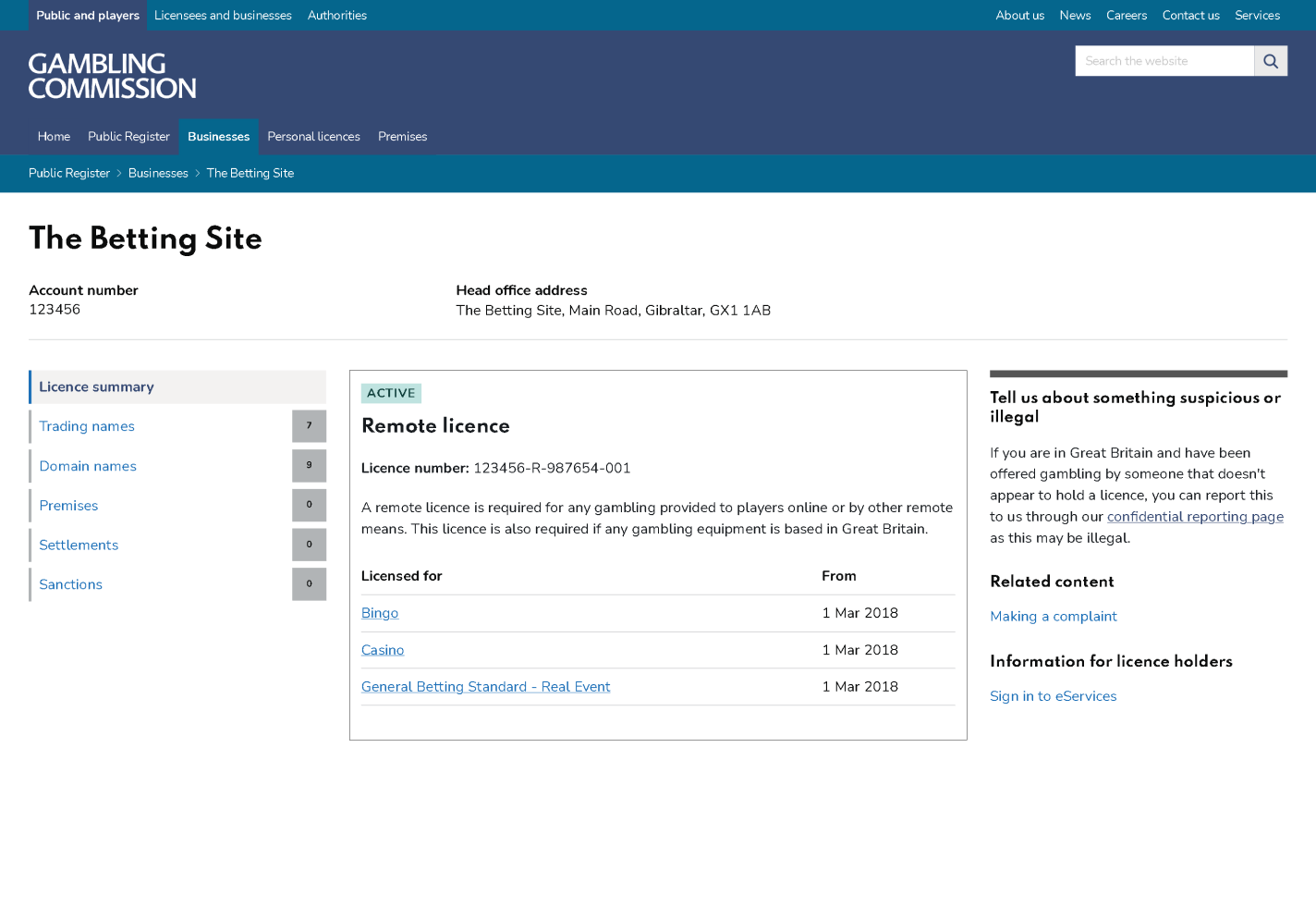- Print the full document
- Save the page as a HTML document to your device
- Save the page as a PDF file
- Bookmark it - it will always be the latest version of this document
This box is not visible in the printed version.
Opening accounts
Information on opening accounts, and the information that gambling businesses must provide you with when doing so.
Published: 23 September 2020
Last updated: 26 August 2023
This version was printed or saved on: 9 February 2026
Online version: https://www.gamblingcommission.gov.uk/public-and-players/guide/opening-accounts
Overview: When you open a new account on a betting site or app, gambling businesses must provide you with the following information:
- the licensed status of the company
- your account
- account fees
- how your money is protected
- free offers and bonuses
- terms and conditions.
Licensed status of the company
The company that owns the betting app or website must have a Gambling Commission licence.
Check if a company is licensed before you open an account
To check a company is licensed, look for the following wording in the footer of the website or app.
If a company has multiple licences for a website or app, multiple account numbers will be listed.
This is an example of how the text should look at the bottom of the screen.

You can also search our public register to check if a company is licensed by searching for the company’s name, or the name of the website or app.
The public register will also show if we have taken any regulatory action against the company.
This is an example of what you'll be able to see on the public register.

Reporting illegal activity
If the gambling business doesn't have a licence it is acting illegally and we can take regulatory action against them. You can report illegal activity to us confidentially.
Information companies must give you about your account
Gambling businesses must provide you with, and make clear, information on the following:
- transactions you can make
- the time you have spent gambling
- how you can set limits on the amount you deposit or spend
- how to request a ‘reality check’ (taking a break from playing)
- any consequences of an interruption to play.
They should also provide information about the game you are playing, including:
- the rules
- a game description
- the probability of you winning.
Other information companies must give you
Players' guides
Different types of businesses may also need to provide players’ guides to their games. For example, a casino must offer a player’s guide to the house edge.
An online gambling business must provide a player’s guide to each gambling product that they offer. This includes each:
- bet
- game
- lottery.
Account fees
Companies can charge fees for accounts that you no longer use, called ‘dormant accounts’.
At least 12 months must have passed since you last used your account for it to be classed as ‘dormant’.
Fees must be reasonable and clearly set out in the company’s terms and conditions. Any charges must reflect the costs that the business pays to maintain your account.
The company must:
- try to return your money before charging you
- remind you 30 days in advance that a fee will be charged from a specific date.
Fees and charges on dormant accounts can bring your balance to zero.
How your money is protected
Any business you make a bet with must tell you in the terms and conditions how your money is protected in case they go bust. You can find out more about the levels of protection and what this means for you.
Gambling safely
Gambling businesses must make information available on how to gamble safely. This includes how to find information or support for problem gambling.
Terms and conditions
Gambling businesses must make sure that any terms and conditions they use are not unfair and must be made available to you in plain and simple language. They must also let you know in advance if they make any significant changes to their terms and conditions.
Legal basis
When you make a gambling transaction you're entering into a contract with the gambling business. Consumer law, such as the Consumer Rights Act 2015 (opens in new tab), protects your rights when you enter into a gambling contract. It protects you against wording in contracts which could be used to give a business an unfair advantage.
The Consumer Rights Act requires the wording in contracts to be:
- fair, so that the contract is not weighted unfairly against the consumer or hidden from them
- transparent, so that the consumer can make a decision based on facts and information.
You can learn more about the Consumer Rights Act on the Citizen's Advice website (opens in new tab).
Complaints and disputes
All licensed gambling businesses must have procedures for handling customer complaints. This includes The National Lottery.
They must also have arrangements for you to refer a complaint to an alternative dispute resolution (ADR) provider if they can't resolve it within 8 weeks. You can find out more about the complaints process.
Free offers and bonuses
Many betting sites and apps offer free incentives. These can include things like free spins or bonus money when you open a new account.
For more information around offers and bonuses, you can read the the Competition and Markets Authority's (CMA) guidance for online gambling promotions (opens in new tab).
Before accepting any offers, there are some things you should check. This video will show you what to look out for.
What to look out for in online betting offers
Read a transcript of this video.
Companies should:
- let you walk away from play at any time
- let you keep what is left of your deposit and any winnings you’ve earned from play with your deposit
- make it clear if you’re playing with your own money or bonus funds which are subject to more restrictions, for example a bonus amount added to your account when you sign up
- be clear about any restrictions on how you can play with bonus funds, such as restrictions on the size of bets.
Companies should not:
- use your name, photo or other personal data for publicity without getting your specific consent to do so
- change the details of a free bet once you’ve accepted the deal and started playing.
If you think you’ve been unfairly treated
If you think that you have been unfairly treated you should follow the complaints process and complain directly the gambling business.
Using e-wallets to bet online
An e-wallet (or electronic wallet) allows you to combine multiple payment methods. You can use the same e-wallet to gamble with different businesses.
Types of e-wallets
There are lots of different types of e-wallet providers, for example PayPal and Skrill.
Some betting sites may also allow you to use digital payment services such as Apple Pay. The company should tell you if there are minimum deposit limits or fees.
Gambling companies can’t accept payments from e-wallets that do not block the use of credit card funds for gambling
The Gambling Commission banned gambling with credit cards. This includes using a credit card through an e-wallet or to deposit money into your e-wallet.
For any given e-wallet provider, gambling companies must ensure that provider doesn't allow customers to fund their e-wallets with credit cards, and then use those funds for gambling.
Companies will need to reject all payments made through an e-wallet provider that does not block:
- credit cards
- credit card funds used for gambling through their wallet facilities.